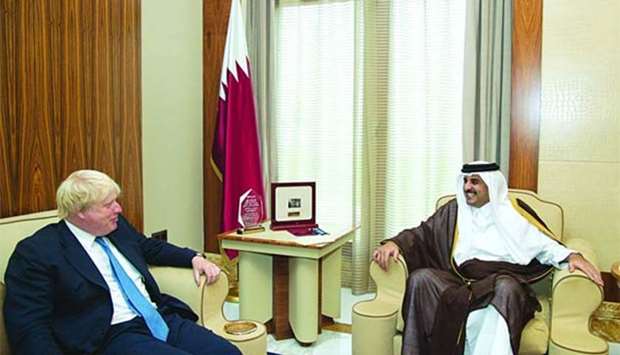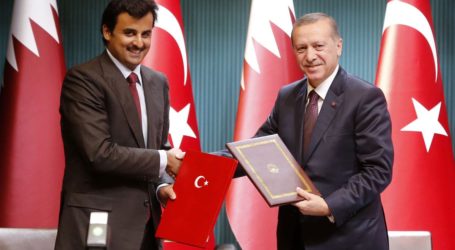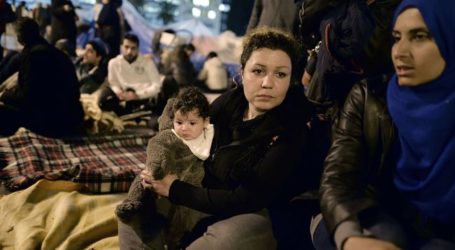End Qatar blockade, UK FM Tells Arab States


Doha, 14 Shawwal 1438/9 July 2017 (MINA) – The Qatari Emir Sheikh Tamim bin Hamad al-Thani and the UK Foreign Minister Boris Johnson discussed on Saturday the latest developments of the Gulf countries crisis and its implications in terms of regional and international stability.
The UK Foreign Minister stressed his country’s support to Kuwait’s mediation efforts, led by Emir Sheikh Sabah al-Ahmed al-Jaber al-Sabah, to resolve the crisis, the Gulf News reported.
The official Qatar News Agency (QNA) said the the meeting held at Al Bahr Palace also dealt with issues of joint interest, particularly terrorism and extremism and the ways to enhance bilateral cooperation as part of regional and international counter-terrorism efforts.
Al-Thani and Johnson reviewed facets of bilateral strategic ties and the means to enhance them in different fields, particularly bilateral cooperation in Qatar’s hosting of the 2022 World Cup.
“The Prime Minister and Minister of Interior Sheikh Abdullah bin Nasser bin Khalifa al-Thani also met with the UK Foreign Minister and the delegation accompanying him,” the media added.
The meeting reviewed bilateral relations between the two nations and the means to enhance them, in addition to discussing the Gulf countries crisis and the latest developments in the region.
The Foreign Minister Mohamed bin Abdulrahman al-Thani met Boris too.
According to QNA, the meeting dealt with bilateral relations and the means to enhance them.
Sheikh Mohamed discussed with Johnson the latest developments of the siege laid on Qatar and all the illegal measures taken against Qatar.
The foreign minister stressed that enforcing unilateral measures against Qatar was against the Charter of the United Nations and a severe violation of international laws, which have led to grave humanitarian consequences and human rights violations.
Sheikh Mohamed also stressed that the siege was set without resorting to the mechanisms adopted by regional and international organisations.
Johnson is on a trip of the Gulf as part of Britain’s efforts to find a solution to the GCC crisis. Johnson met with his Kuwaiti counterpart Sheikh Sabah al-Khaled al-Sabah in Kuwait before coming to Qatar.
Hoping there will a de-escalation
In a televised interview released to media after meeting senior government figures in Kuwait, Johnson said: “What people need to see is de-escalation and progress towards tackling the funding of terrorism in the region, and progress toward an end to this blockade.”
Johnson, who also held talks in Saudi Arabia and Abu Dhabi on Friday, said it was “highly unlikely” that the current standoff would descend into military conflict.
“Everybody I have talked to said the opposite. No possibility of a military confrontation,” he said.
“The blockade is unwelcome and we hope there will be a de-escalation,” he added.
Saudi Arabia, the United Arab Emirates, Egypt and Bahrain last month announced the severing of all diplomatic ties with Qatar over allegations Doha funded Islamist extremists and had close ties to Iran.
On June 22, they issued a 13-point list of demands, including downgrading ties with Iran and shutting down broadcaster Al Jazeera, as a prerequisite to lift the sanctions, which include the closure of Qatar’s only land border and suspension of all flights to and from the country.
Doha has refused to comply with the demands and denies accusations of ties to Islamist groups.
Kuwait has been leading mediation efforts to resolve the crisis. Kuwaiti officials have held talks with the foreign ministers of Germany and fellow Gulf Cooperation Council member Oman, which has not joined the Qatar boycott.
US Secretary of State Rex Tillerson is scheduled to arrive in Kuwait on Monday for talks on the Gulf crisis.
Johnson said progress could be made to heal the rift between Qatar and other Arab states, although a solution was unlikely to be found immediately.
“My impression is progress can be made and there is a way forward,” Johnson said adding “but I’m not going to pretend to you now that it is necessarily overnight or this is going to be done in the next couple of days”.(T/RE1/RS5)
Mi’raj Islamic News Agency (MINA)






